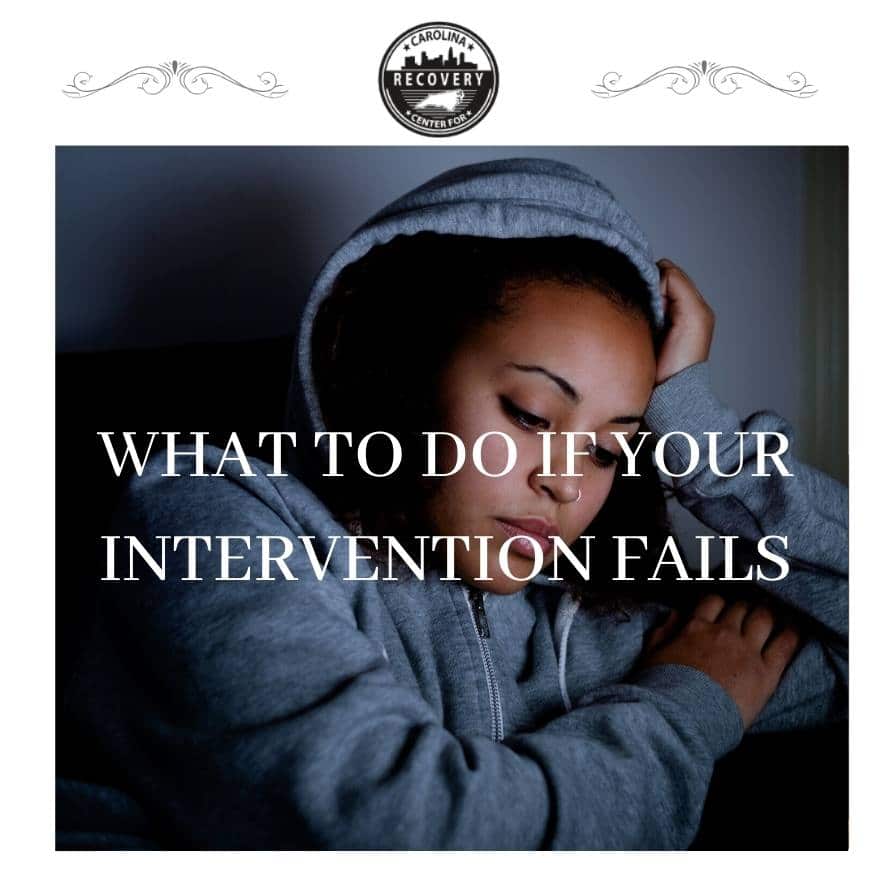What to Do if Your Intervention Fails

Medically Verified: 2/1/24
Medical Reviewer
Chief Editor

All of the information on this page has been reviewed and verified by a certified addiction professional.
Addiction affects millions of Americans and can impact every aspect of a person’s life. It can cause severe damage to a person’s short and long-term physical and mental health, as well as cause lifelong financial and social problems. The effects of addiction are not only felt by the person who struggles with it but their loved ones and community, too.
It is incredibly difficult to watch your loved one struggle with addiction. You might feel confused, helpless, or discouraged as you watch them face the consequences of their substance use. In some cases, concerned family and friends may stage an intervention to prompt their loved ones to get addiction treatment.
An intervention is a planned event where friends and family members offer support and help to their loved ones and explain how their addiction has affected their own lives. When planning the drug and alcohol intervention, they gather up resources and treatment options to offer to their loved ones. Together, they decide on what the consequences will be if the person does not accept help.
Hiring a professional interventionist can be very helpful in staging a successful event, but even the most organized interventions can fail. If you are planning to host an intervention for a loved one, or you have gone through a failed intervention, knowing how to handle failure can be helpful.
Common Problems During an Intervention
No matter how organized and ready you and the others are, interventions can fail for a variety of factors that are out of your control. This can be very difficult to accept, especially with an emotional, high-risk issue like an addiction. There are several ways in which an intervention can fail.
Your loved one is under the influence of drugs or alcohol during the intervention.
If your loved one is not sober, they may be unable to understand or process what is being offered. It may be difficult to determine if your loved one is under the influence, and a trained interventionist can help you look for the signs. If they are, the intervention must be stopped and you can make another attempt at a later time
Emotions are running too high.
Interventions are naturally very emotional events. It can be difficult to watch your loved one struggle and they may react in ways that are difficult to see. A good intervention is calm, organized, and matter-of-fact. Preparation and professional support can help everyone involved to stay calm, but if emotions are elevated, an intervention is likely to fail.
Your loved one gets angry or abusive.
In some cases, the person at the center of the intervention may become angry or even abusive during the event. Even if the intervention is calm and organized, they may still feel as though they are being ambushed or may become defensive. If your loved one becomes angry and can’t hear what you’re saying, you must stop the event and try again at a later date.
Your loved one rejects help or leaves.
For a variety of reasons, your loved one may refuse to listen or might even leave the site of the intervention before anyone can speak.
These situations can be disappointing and frustrating. It is possible to move on after a failed intervention. Do not give up on offering your loved ones the help they need.
What to Do If Your Intervention Doesn’t Work
During the planning process, you will determine what consequences will occur if your loved one refuses help. If they reject treatment or do not participate in the intervention at all, you will need to follow through on those consequences. It is important that you do not waver from what you said you’d do, and that you do not bargain or barter with your loved one. Your loved one will likely be upset, but you must not negotiate with them.
Immediately after the failed intervention, take some time to talk and process with the other people involved. People may be feeling a range of emotions–anger, anxiety, sadness, or frustration. In time, you may begin to plan a new intervention for another time. If you did not hire a professional interventionist for the first one, you may want to consider it for the next intervention. A professional can help determine what went wrong during the event and help you avoid another setback.
Moving on After a Failed Intervention
Loving someone who struggles with addiction can be emotional and exhausting, so take time to do self-care. This may include joining a support group or participating in individual therapy. Be gentle with yourself as you continue to be firm about the boundaries you are maintaining with your loved one. Take care of yourself as you prepare for a new intervention and encourage the others involved to do the same.
As much as possible, think of the failed intervention as a learning experience. Take time to evaluate what happened, including what went well and what did not. Get professional support as you prepare for the next one and be ready to help your loved one get into treatment if they suddenly change their mind.
An intervention is a labor of love. While it may not be successful the first time around, your loved ones will know that you care and are ready to help them get the treatment they need.
Find Help for a Loved One in North Carolina
If you or someone you love requires comprehensive, compassionate addiction treatment, you are not alone. At Carolina Center for Recovery, we offer a variety of programs designed to empower people at every stage of their recovery journey. To talk to an admissions counselor, give us a call today.

